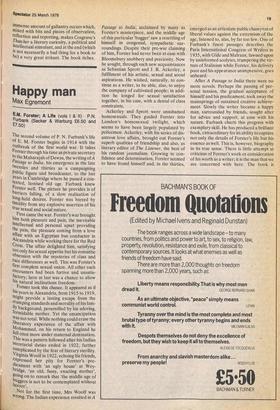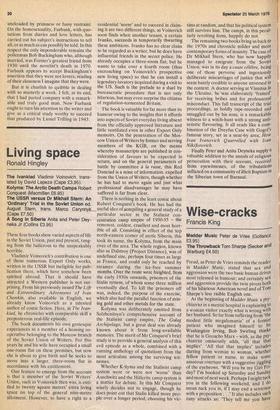Happy man
Max Egremont
E.M. Forster; A Life (vols I & II) P.N. Furbank (Secker & Warburg £6.50 and 27.50)
The second volume of P. N. Furbank's life of E. M. Forster begins in 1914 with the Outbreak of the first world war. It takes Forster through his time as private secretary to the Maharajah of Dewas, the writing of A Passage to India, his emergence in the late twenties and thirties as a campaigning Public figure and broadcaster, to the last Years in Cambridge where he passed a contented, lionised old age. Furbank knew Forster well. The picture he provides is of barriers falling, of a slow, realisation of lung-held desires. Forster was barred by timidity from any explosive assertion of his true sexual and social nature.
First came the war. Forster's war brought him both pleasure and pain, the inevitable intellectual and personal upset providing the pain, the pleasure coming from a love affair with an Egyptian bus conductor in Alexandria while working there for the Red Cross. The affair delighted him, satisfying liot only his sexual appetite but his romantic Obsession with the mysteries of class and race differences as well. This was Forster's first complete sexual union. All other such encounters had been furtive and unsatisfactory; here at last was a chance to allow his natural inclinations freedom.
Forster took this chance. It appeared as if his years in Alexandria, from 1915 to 1919, might provide a lasting escape from the cramping standards and morality of his family background, personified by his adoring, formidable mother. Yet the emancipation was not total. While nothing could erase the liberatory experience of the affair with Mohammed, on his return to England he fell once more under maternal domination. This was a pattern followed after his Indian
secretarial duties ended in 1922, further complicated by the fear of literary sterility. Virginia Woolf in 1922, echoing his friends,
expressed her pity for Forster's pre dicament with 'an ugly house' at Weybridge, 'an old, fussy, exacting mother', going on to remark that 'the middle age of buggers is not to be contemplated without horror'.
Not for the first time, Mrs Woolf was wrong. The Indian experience resulted in A Passage to India, acclaimed by many as Forster's masterpiece, and the middle age of this particular 'bugger' saw a resettling of himself in congenial, sympathetic surroundings. Despite their pre-war claiming of him, Forster had never been at ease with Bloomsbury snobbery and preciosity. Now he sought, through such new acquaintances as Sebastian Sprott and J. R. Ackerley, a fulfilment of his artistic, sexual and social aspirations. He wished, naturally, to continue as a writer, to be able, also, to enjoy the company of cultivated people; in addition he longed for sexual satisfaction together, in his case, with a denial of class constraints.
Ackerley and Sprott were unashamed homosexuals. They guided Forster into London's homosexual twilight, which seems to have been largely populated by policemen. Ackerley, with his series of disastrous love affairs, brought out Forster's superb qualities of friendship and also, as literary editor of The Listener, the best of his random journalism. Growing in confidence and determination, Forster seemed to have found himself and, in the thirties, emerged as an articulate public champion of liberal values against the extremism of the age, listened to, alas, by far too few. One of Furbank's finest passages describes the Paris International Congress of Writers in 1935, with Gide and Malraux, fawned upon by uninformed acolytes, trumpeting the virtues of Stalinism while Forster, his delivery poor and his appearance unimpressive, goes unheard.
After A Passage to India there were no more novels. Perhaps the passing of personal tension, the gradual acceptance of himself and his predicament, took away the mainsprings of sustained creative achievement. Slowly the writer became a happy man, surrounded by friends, sought after for advice and support, at ease with his nature. Furbank charts this progress with exemplary skill. He has produced a brilliant book, extraordinary for its ability to capture not only the details of Forster's life but his
essence as well. This is, however, biography• in its true sense. There is little attempt at
criticism of Forster's work or consideration of his worth as a writer; it is the man that we are concerned with here. The book is unclouded by primness or fussy restraint. On the homosexuality, Furbank, with quotations from diaries and love letters, has carried out his subject's instructions to tell all, or as much as can possibly be told. In this respect the only imponderable remains the policeman Bob Buckingham who, although married, was Forster's greatest friend from 1930 until the novelist's death in 1970. Furbank appears to accept Buckingham's assertion that they were not lovers; reading of their closeness I imagine that they were.
But it is churlish to quibble in dealing with so masterly a work. I felt, at its end, that I had parted company with a remarkable and truly good man. Now Furbank ought to turn his attention to the writer and give us a critical study worthy to succeed that produced by Lionel Trilling in 1943.



































 Previous page
Previous page